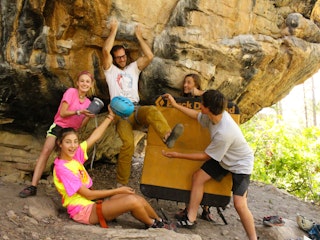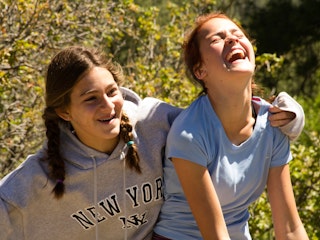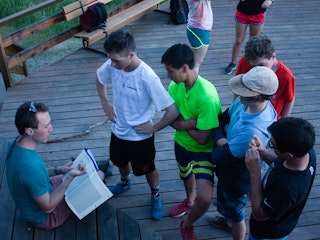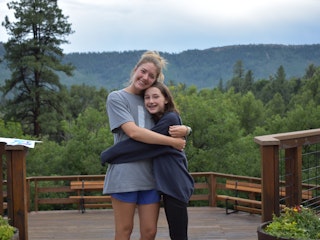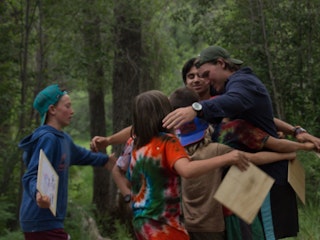Research shows...
…that camp is a vital educational experience that every child should have. We have understood this on an elemental level from the genesis of the Colvig Silver Camps idea. We can now say it with increasingly full and rigorous science-based evidence, some of which CSC has been directly involved in.
It is common to hear about 21st-century skills – those skills identified by large employers, educators, and government agencies, as important in 21st-century society and workplace. Skills such as analytic reasoning, problem-solving, teamwork, and adaptability help people successfully navigate the increasingly rapid evolution of the job market, and the increasing likelihood of job mobility. As a result of a variety of different reasons being currently debated, many families find that current educational systems do not develop these skills adequately.
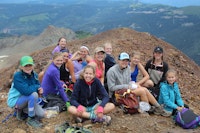
This observation is not intended as a critique of our teachers. Our estimation is that they are one of the most significantly undervalued resources in American society. We give them little to work with and expect them to do extraordinary things with our children. And more often than not, they do. Instead, our intent is to point out that our efforts can complement theirs by providing an experience that develops our camper’s ability to learn, to easily adapt, to happily initiate effort, to see problems from multiple angles, and to be confident, comfortable, and considerate in their interaction and collaboration with others.
So you understand these needs and, with varying success, you go out and look for opportunities to develop these skills. However, it is often difficult to estimate which ones will achieve this goal when most of the evidence is anecdotal. This is particularly challenging in discussions about a quality camp experience because the stories often sound so positively exaggerated as to be unbelievable, sometimes even if you are the one telling the story. To the “uninitiated” it is hard to understand exactly what happens at CSC.
Which brings us to our interest and involvement in the camping industry’s relatively recent and abundant efforts to evaluate and measure our short and long-term success by rigorously studying the outcomes that we espouse. These efforts are primarily spearheaded by the American Camp Association (ACA) though there is much independent research as well. We’d like to share some of the results with you here.
From a 2004 three-year ACA research effort that was the largest study of camper outcomes ever conducted in the US at the time and that was integrated with a larger comparable effort studying the same things in other educational/developmental venues:
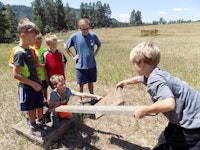
Research shows… that 83% of parents reported an increase in their child’s confidence one month after camp.
Research shows…that among 10 primary human development outcomes that were studied, such as leadership, values, and decision-making, the summer camp experience consistently outperformed other opportunities such as school, sports, after-school programs, etc.
From a 2015 ACA Youth Outcomes Battery CSC was involved in designed to assess camper perceptions of change in themselves during their time at camp:
Research shows…a camp experience leads to positive change in independence, problem-solving confidence, friendship skills, and affinity for nature.
Research shows…CSC performance in these changes rates above the national average in all four areas.
From a recent conference session by Laurie Browne, director of research at the ACA, who summed up emergent findings from phase 1 of Research 360, a current 5-year research effort by the ACA focused on measuring long-term impacts of a camp experience:
Research shows… that camp provides campers things that last and that help them thrive in school, work, and their general lives.
Research shows… that when staff who have had a camper experience were asked these four questions…
-
What do you now use most in school that you learned at camp?
-
What did you learn at camp that you now use in the workplace?
-
What did you learn at camp that is distinct, that you didn’t learn anywhere else?
-
What did you learn at camp that is transferable, that is most important in your life today?…
Relationship Skills was the top-ranked answer to all 4 of these questions. Other highly ranked answers included teamwork, self-identity, and the ability to appreciate differences.
Research shows…that there are 5 things identified as key aspects of their camp experiences that led to these outcomes.
-
Experiential learning.
-
Small group experiences.
-
Schedules and structures that they had a part in managing.
-
Separate time and space away from day to day stresses, struggles, and technology.
-
And, most significantly,caring and relatable staff.
Though we weren’t involved in this study we find the results immensely affirming, as these have always been 5 of the fundamentally defining aspects of CSC.
And finally, from some internal research that we did with campers last summer, again trying to gauge a change in a personal quality of theirs during their time at camp:
Research shows…that CSC engenders capability, as seen in this camper quote, “When my friend was convinced she couldn’t keep going and I encouraged her and helped her I learned you can lead someone to accomplish anything.”
Just a few more reasons to feel good about your decision to be a part of the CSC community. Not just because it is non-stop crazy fun, but also because it provides a vital developmental experience that helps campers succeed at life, in this century and any other.
